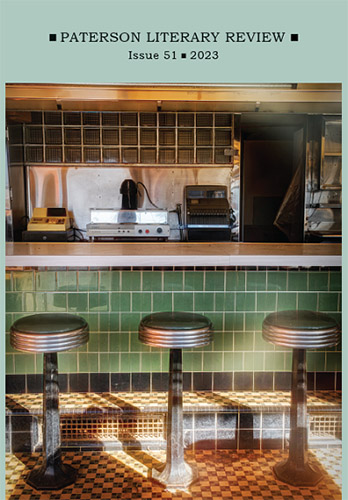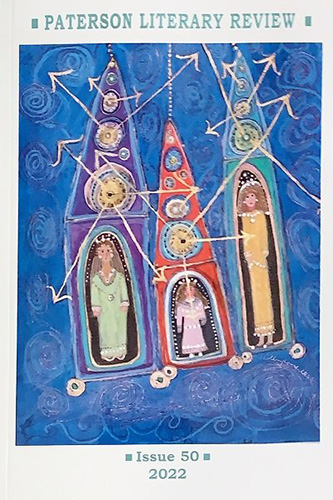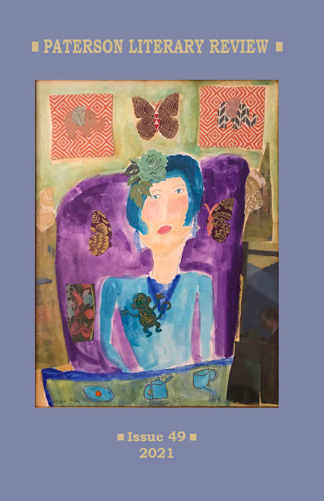Paterson Literary Review – 2012/2013
Issue 40
2012-2013
Annual
Kenneth Nichols
The Paterson Literary Review only arrives once a year, but leaves a lasting impression. This Passaic County Community College-based journal boasts 400 pages of poems, stories and essays and could easily keep you occupied during several intercontinental flights. In her editor’s note, Maria Mazziotti Gillan declares one of her primary motivations for selecting work from the 10,000 submissions the PLR receives each year: “I attempt to be inclusive of the work of writers from many races and ethnicities, choosing what I believe to be the best works.” She certainly achieved her goal; the journal balances the experimental and the traditional, the personal and the universal.
The Paterson Literary Review only arrives once a year, but leaves a lasting impression. This Passaic County Community College-based journal boasts 400 pages of poems, stories and essays and could easily keep you occupied during several intercontinental flights. In her editor’s note, Maria Mazziotti Gillan declares one of her primary motivations for selecting work from the 10,000 submissions the PLR receives each year: “I attempt to be inclusive of the work of writers from many races and ethnicities, choosing what I believe to be the best works.” She certainly achieved her goal; the journal balances the experimental and the traditional, the personal and the universal.
I’m not really sure how I missed her work before, but the five poems Lyn Lifshin contributed to this volume are a great introduction. Lifshin’s poem, “When My Mother Felt Like a Balloon Getting Smaller” articulates the simultaneous specificity and generality of grief. Lifshin collects a number of events that occurred between a mother and daughter:
When she stopped telling
me I ruined my hair . . .
. . . . . . . . . . . . . . . . . . . .
When my mother, who could
sprint up Beacon Hill in
spike heels had to sit down
in malls . . .
In each of her poems, Lifshin engages the reader with a conversational style, and her choices in punctuation and lineation create a great deal of momentum.
“Gravity,” a short story from Jaimee Wriston Colbert, stands out for a number of reasons. Colbert grabs her reader immediately, establishing the narrator’s life in the doldrums and the interesting thread that runs through the story: Mel Gibson is coming to scout the restaurant at which the first-person narrator works as a waitress. Everything around the narrator is also in the doldrums: the region is in decline, her mother is addicted to pills, her boyfriend is preoccupied by alternating thoughts of explosions and his ex-wife. Early on, Colbert indicates that her narrator may have a chance at a better life: she literally flew away to Hawaii after winning a radio contest and is focused on her figurative desire to fly away in the same manner of the birds she loves. Colbert’s story nails the voice of the character and offers a satisfying conclusion.
What is the connection between depression and great writing? David Ray’s essay examines the extensive history of mental illness in writers and attempts to explain the long list roster of writers who, to paraphrase Hamlet, opted out of experiencing any more of the thousand natural shocks that flesh is heir to. Ray examines a number of cases and draws on a number of interesting sources to make his ultimate claim: “Perhaps true dedication always involved sacrifice of the self in one form or another, and the balancing act essential for survival is not always successful.”
The issue concludes with the winners of the 2010 Allen Ginsberg Poetry awards. First Prize was shared by Rafaella Del Bourgo and Kathleen Spivack, both of whom submitted stream-of-consciousness memories that contemplate life in a different time and place. Del Bourgo dedicated “Olive Oil” to her grandmother, a woman whose marriage was arranged and who outlived her husband. After he died, Del Bourgo’s grandmother was forced to dismantle the life she had shared with her husband by selling the objects she loved in order to survive. Spivack’s “Their Tranquil Lives” evokes the joy of Vienna “before History,” before the passion for destruction replaced the passion to create.
The sheer bulk of this issue of Paterson Literary Review ensures that any reader will find plenty to enjoy. Editor Maria Mazziotti Gillan managed to blend work from an impressive list of established writers with material from relative newcomers that quickly prove they belong.
[www.pccc.cc.nj.us/poetry]




